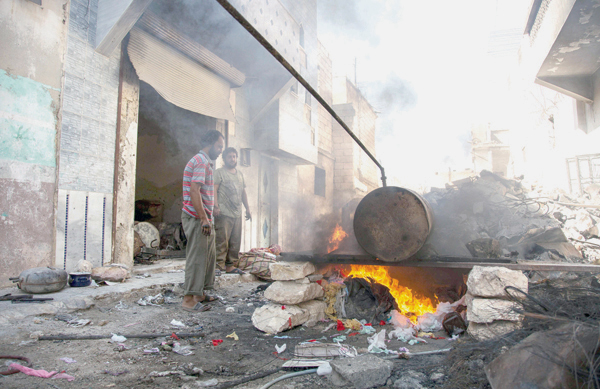ALEPPO, Syria — In a destroyed building in Syria's Aleppo, neighbours Abu Ahmed and Mohammed Ibrahim desperately rummaged through rubble and debris in search of scraps of plastic to turn into fuel.
Residents of the rebel-held eastern districts of the city have struggled to keep their cars running or their electricity on since government forces first besieged their neighbourhoods this summer.
"There's no more fuel on the market, no heating oil, no petrol, no gas," said Abu Ahmed, 40.
"So we've decided to turn to alternatives," he added, with plastic as the raw material in a dangerous and primitive process of extracting fuel to fire up electricity generators.
Fierce clashes south of Aleppo this summer damaged the only power plant that served eastern parts of the city, leaving 250,000 residents without electricity since July.
In their native Sakhur district, Abu Ahmed and Mohammed packed plastic objects into black barrels, which were then sealed and heated on a wooden fire.
The plastic melts and produces a gas that is piped and cooled, resulting in a yellow liquid used as diesel by the desperate residents of eastern Aleppo.
"We found out about this by looking on the Internet and seeing how residents of Ghouta produce diesel, so we are copying them," Abu Ahmed said, referring to another rebel-controlled and besieged area near Damascus.
Food and fuel shortages have combined to make life a daily grind for residents of Aleppo, where many districts have to survive on three hours of generator-powered electricity a day — and some make do with none at all.
Skyrocketing prices
The price of the rare fuel supplies in Aleppo has rocketed to 1,200 Syrian pounds ($2.3 at the current black market rate) for a litre or nearly a quarter of a gallon of diesel, compared with 350 pounds before the blockade.
Residents have been anxiously awaiting deliveries of food and fuel since a ceasefire came into force on Monday, but no aid has entered the city yet.
Forty UN trucks carrying food aid — enough to feed 80,000 people for one month — remain stuck on Syria's border with Turkey.
With living conditions so basic, Mustafa Marjan, a 30-year-old resident of the Zabadiya district, remained unimpressed by the truce.
"I don't only want the bombs to stop — we want vegetables and fuel to be allowed in!" he bellowed.
"How can we cook and feed our children if there's no fuel on the market?"
Their diesel-starved cars and buses parked on debris-ridden routes, Aleppo's residents are left with only their feet for transport.
"We're only extracting between 70 and 80 litres a day," said Abu Ahmed of the plastic-based process he used.
Most of what he and his colleagues make goes to feed generators used by residents to pump water from wells.
"Our goal is not to make a profit but to serve our neighbourhood, by giving people a degree of self-sufficiency," said his neighbour, Mohammed Ibrahim.
The operation is riddled with dangers, and in this case had a shocking outcome.
Just days after speaking to AFP, Abu Ahmed and one of his colleagues were burned to death when a barrel exploded during the melting process.
